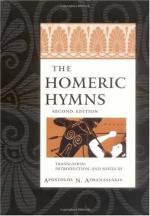PREFACE
To translate the Hymns usually called “Homeric” had long been my wish, and, at the Publisher’s suggestion, I undertook the work. Though not in partnership, on this occasion, with my friend, Mr. Henry Butcher (Professor of Greek in the University of Edinburgh), I have been fortunate in receiving his kind assistance in correcting the proofs of the longer and most of the minor Hymns. Mr. Burnet, Professor of Greek in the University of St. Andrews, has also most generously read the proofs of the translation. It is, of course, to be understood that these scholars are not responsible for the slips which may have wandered into my version, the work of one whose Greek has long “rusted in disuse.” Indeed I must confess that the rendering “Etin” for [Greek text] is retained in spite of Mr. Butcher, who is also not wholly satisfied with “gledes of light,” and with “shieling” for a pastoral summer station in the hills. But I know no word for it in English south of Tweed.
Mr. A. S. Murray, the Head of the Classical Department in the British Museum, has also been good enough to read, and suggest corrections in the preliminary Essays; while Mr. Cecil Smith, of the British Museum, has obligingly aided in selecting the works of art here reproduced.
The text of the Hymns is well known to be corrupt, in places impossible, and much mended by conjecture. I have usually followed Gemoll (Die Homerischen Hymnen, Leipzig, 1886), but have sometimes preferred a Ms. reading, or emendations by Mr. Tyrrell, by Mr. Verral, or the admirable suggestions of Mr. Allen. My chief object has been to find, in cases of doubt, the phrases least unworthy of the poets. Too often it is impossible to be certain as to what they really wrote.
I have had beside me the excellent prose translation by Mr. John Edgar (Thin, Edinburgh, 1891). As is inevitable, we do not always agree in the sense of certain phrases, but I am far from claiming superiority for my own attempts.
The method employed in the Essays, the anthropological method of interpreting beliefs and rites, is still, of course, on its trial. What can best be said as to its infirmities, and the dangers of its abuse, and of system-making in the present state of the evidence, will be found in Sir Alfred Lyall’s “Asiatic Studies,” vol. ii. chaps. iii. and iv. Readers inclined to pursue the subject should read Mr. L. R. Farnell’s “Cults of the Greek States” (Clarendon Press, 1896), Mr. J. G. Frazer’s “Golden Bough,” his “Pausanias,” and Mr. Hartland’s work on “The Myth of Perseus.” These books, it must be observed, are by no means always in agreement with my own provisional theories.
ESSAYS INTRODUCTORY
THE SO-CALLED HOMERIC HYMNS




